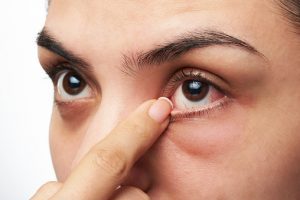
As the name would indicate, age is the primary risk factor and the risk of developing age-related macular degeneration increases with age. For those aged 50 to 59, the risk of AMD increases two percent each year but jumps 30 percent for those over the age of 75.
There are different types of age-related macular degeneration such as wet and dry, which is outlined below. Furthermore, aside from age, other risk factors include stress and diet.
Below you will uncover all the information you need to know about AMD and how you can protect yourself as you age.
Dry macular degeneration: Causes, symptoms, and dry vs. wet AMD
Dry macular degeneration is a common eye disorder that requires early treatment if you want to avoid vision loss, but macular problems can also be classified as wet. So, here we take a look at dry vs. wet AMD (age-related macular degeneration).
Dry macular degeneration is an eye issue that tends to occur in people over the age of 65. It impacts the part of the retina (macula) that is responsible for clear vision in our direct line of sight. It can develop in one eye and then progress to both eyes. Dry age-related macular degeneration makes it difficult for some people to read, drive, and even recognize faces—however it does not necessarily mean that you lose your sight completely. Continue reading…
Dry macular degeneration treatment can be complicated. The condition is a common eye disorder that generally affects people over the age of 65. The macula is the part of the eye responsible for clear vision directly in your line of site. Therefore, degeneration or deterioration of the macula can lead to blurry or reduced central vision.
It can affect one or both eyes and can even worsen vision over time. Having the inability to see clearly can affect your ability to read, drive, or recognize faces. Most people with dry macular degeneration don’t lose all of their sight, but instead, their sight is severely compromised. The condition only affects central vision while sparing peripheral vision. Continue reading…
Wet macular degeneration is an eye disease that can cause blurred vision or even blind spots in a person’s visual field. While it is not as common as dry macular degeneration, it does account for 90 percent of all cases of severe vision loss resulting from the disease.
Macular degeneration is a leading cause of vision loss in people over the age of 60. It happens when a small portion of the retina, referred to as the macula, deteriorates. Wet macular degeneration takes place when abnormal blood vessels leak fluid or blood into the macula. As a result, patients may see spots in the center of their field of vision or they may notice that straight lines appear wavy since the macula isn’t smooth anymore. Continue reading…
New research was recently published in the journal Optometry and Vision Science examining the role that psychological stress plays in relation to age-related macular degeneration (AMD). Age-related macular degeneration is a form of progressive vision loss that is the most prevalent cause of vision loss among older Americans.
It is classified as an inflammatory disease, and as such, the study focused on the link between stress and inflammation and how it affects the treatment outcomes for the disease. Those experiencing vision loss due to AMD also experience higher rates of stress, anxiety, and depression, though whether these psychological conditions worsen the progression of the disease is unknown. Continue reading…
Our ability to see is something we should all cherish. Seeing the beauty of a sunset or the smile of your newly born grandchild can help create memories that last a lifetime. Unfortunately, as with all things in life, our eyes gradually begin to deteriorate, being encumbered by a decreased visual field, floaters, or even complete vision loss.
And then there’s macular degeneration, a form of irreversible vision loss in people over the age of 60 that develops with age. It is never a cause of total blindness, but it can be a source of significant visual disability. A new study has found that switching to a low glycemic diet could potentially put a stop to this disease altogether.
Age-related macular degeneration occurs when the small central portion of the retina, called the macula, begins to deteriorate or decline in its ability to sense light. Continue reading…